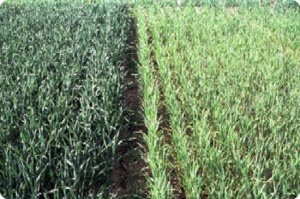Soil Fertility Extension Program

N deficient wheat, Havre, 1996. Image by R. Engel
The Soil Fertility/Nutrient Management program at MSU focuses on the processes that affect soil fertility and nutrient losses so that nutrients can be managed more sustainably. Soil testing can detect low nutrient levels that lead to possible crop nutrient deficiencies. In addition, soil testing allows for timely adjustments in fertilizer applications, reducing input costs. Understanding the economics of fertilizing, yield goals, and crop quality, along with soil fertility management can assist the producer in meeting profit goals.
Research conducted at MSU, the Agricultural Research Centers, and throughout the region are synthesized into fact sheets, modules, and presentations geared toward extension agents, crop advisers, farmers, ranchers, and/or homeowners. The current research focus is on cropland soil acidification, improving nitrogen management in dryland cropping systems, and sulfur fertilization rates for canola, pea, and wheat.
Use the search bar below to find information on specific soil fertility topics:
If you have any questions about soil nutrients, the Soil Fertility Extension program or materials contained in this web site, contact Dr. Clain Jones. If you think plant growth issues may be related to pesticide (e.g., herbicide residual in compost), please contact Noelle Orloff (994-6297) or Dr. Tim Seipel (994-4783) for assistance.
What's New:
- Timely Topic: Spring phosphorus fertilizer recommendations (MSU press release - Feb 2024)
- Timely Topic: Including sulfur in soil fertility programs can benefit crops (MSU press release - Jan 2024)
- An article on lime management to increase soil pH in semi-arid regions of the U.S. (Crops & Soils Magazine, American Society of Agronomy, January 2024)
- Timely Topic: Clain shares advice on weather-based spring fertilizer adjustments (MSU press release - March 2023)
- Results from a lentil inoculant and fertilizer study from MSU available online (MSU press release - February 2023)
- Three new extension publications for managing soil fertility of market gardens:
- Drought resources:
- MSU and regional research on cover crops in semi-arid dryland systems has been summarized in 4 Extension publications:
- Our soil acidification website has more information about this emerging issue. Clain discusses causes and management
options in an interview with Russell Nemetz from Northern Ag Network and with Rachel Cramer from Yellowstone Public Radio (go to around minute 10 of the program), plus 3 Fertilizer eFacts on soil acidification:
- Soil Acidification: An Emerging Problem in MT
- Soil Acidification: Mitigating Yield Loss with Seed-Placed P fertilizer and Aglime
- Soil Acidification: Remediation with Sugar Beet Lime
- This MSU press release presents the issue of soil acidification provides information on what to look for in fields.
